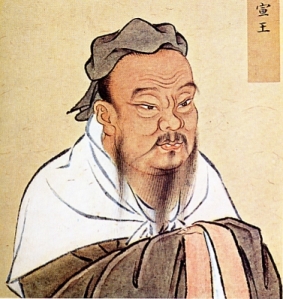16 translations
1. James Legge (1891):
Heaven and earth do not act from (the impulse of) any wish to be2. Archie Bahm (1958):
benevolent; they deal with all things as the dogs of grass are dealt
with.
The sages do not act from (any wish to be) benevolent; they
deal with the people as the dogs of grass are dealt with.
Opposites are not sympathetic to each other.3. Frank MacHoven (1962):
Each one of the many kinds of opposites acts as if it could get along without its other.
But Nature treats opposites impartially, dealing with each of every pair of opposites with the same indifference.
And the intelligent man will regard opposites in the same manner.
Nature is indifferent to life. It realizes everything is as a straw dog. The truly wise are also indifferent to life. They realize humanity is as a straw dog.4. D. C. Lau (1963):
Heaven and earth are ruthless, and treat the myriad creatures as straw dogs;5. Gia-Fu Feng and Jane English (1972):
the sage is ruthless, and treats the people as straw dogs.
Heaven and earth are ruthless;6. Stan Rosenthal (1984):
They see the ten thousand things as dummies.
The wise are ruthless;
They see the people as dummies.
Nature acts without intent, so cannot be described7. Jacob Trapp (1987):
as acting with benevolence, nor malevolence to any thing.
In this respect, the Tao is just the same,
though in reality it should be said that nature follows the rule of Tao.
Therefore, even when he seems to act in manner kind or benevolent,
the sage is not acting with such intent, for in conscious matters such as these, he is amoral and indifferent.
“Nature Seems Unkind”8. Stephen Mitchell (1988):
Nature seems unkind,
As indifferent to its own offspring
As if they were but sacrificial straw dogs.
The Sage, too, seems unkind,
As impartial as Nature;
Yet, like Nature, he benefits all.
The Tao doesn't take sides;9. Victor Mair (1990):
it gives birth to both good and evil.
The Master doesn't take sides;
she welcomes both saints and sinners.
Heaven and earth are inhumane;10. Michael LaFargue (1992):
they view the myriad creatures as straw dogs.
The sage is inhumane;
he views the common people as straw dogs.
“Heaven and Earth are not Good11. Peter Merel (1995):
they treat the thousands of things like straw dogs.
The Wise Person is not Good
he treats the hundred clans like straw dogs.”
“Nature”12. Ursula LeGuin (1997):
Nature is not kind;
It treats all things impartially.
The Sage is not kind,
And treats all people impartially.
“Useful Emptiness”13. Ron Hogan (2002):
Heaven and earth aren't humane.
To them the ten thousand things
are straw dogs.
Wise souls aren't humane.
To them the hundred families
are straw dogs.
Tao's neutral:14. Roger T. Ames and David L. Hall (2003):
it doesn't worry about good or evil.
The Master's are neutral:
they treat everyone the same.
The heavens and earth are not partial to institutionalized morality.15. Yasuhiko Genku Kimura (2004):
They take things (wanwu) and treat them all as straw dogs.
Sages too are not partial to institutionalized morality.
They treat the common people as straw dogs.
The Kosmos is not humane;16. Stephen Addiss and Stanley Lombardo (2007):
Impartially, it treats all things as transitory.
The sage is not humane;
Impartially, he treats all people as transitory.
Heaven and Earth are not kind:
The ten thousand things are straw dogs to them.
Sages are not kind:
People are straw dogs to them.
Eight of the 16 translations use the phrase "straw dogs." What are straw dogs anyway? Besides the title of a movie, I mean? ("Straw Dogs" is a 2011 movie with James Marsden and Kate Bosworth, which is a re-make of a 1971 movie with Dustin Hoffman and Susan George. A couple moves to a rural town and face increasingly vicious harassment from the locals. It's a psychological thriller.) In ancient China, straw dogs were ceremonial objects -- sacrificial animal-images. "These sacrificial objects are artifacts that are treated with great reverence during the sacrifice itself, and then after the ceremony, discarded to be trodden underfoot" (Ames and Hall). So when nature/reality/heaven and earth treats us as a "straw dog", are we talking about during the sacrifice itself or after? Interesting. If you find that life is treating you really well, it means you're about to be sacrificed. If life is trodding you underfoot, at least you know the sacrifice is over.
Lao Tsu begins by telling us what our parents and teachers so often repeated: Life isn't fair. Heaven and earth aren't kind. In particular, they are not "partial to institutional morality," -- which means the world isn't bound by your ideas of what's fair, or your ideas of right and wrong and good and bad.
Then Lao Tsu tells us that, if we are to be as the sages, then we, too, must treat people the same way. What does that mean? Kimura indicates this means treating them as transitory -- not getting attached to them, just as earth and sky don't appear to be attached to any particular individual. Others suggest this means treating people impartially, the same: "she welcomes both saints and sinners."
Virtue really must be its own reward. Nature won't treat you any better for it. Nor will the wise.
Likewise, it's not your job -- it isn't anybody's -- to praise and condemn, as if the world would want to change itself to accord with your judgment of what it should be.
* * *
See: Saturdao Index



No comments:
Post a Comment